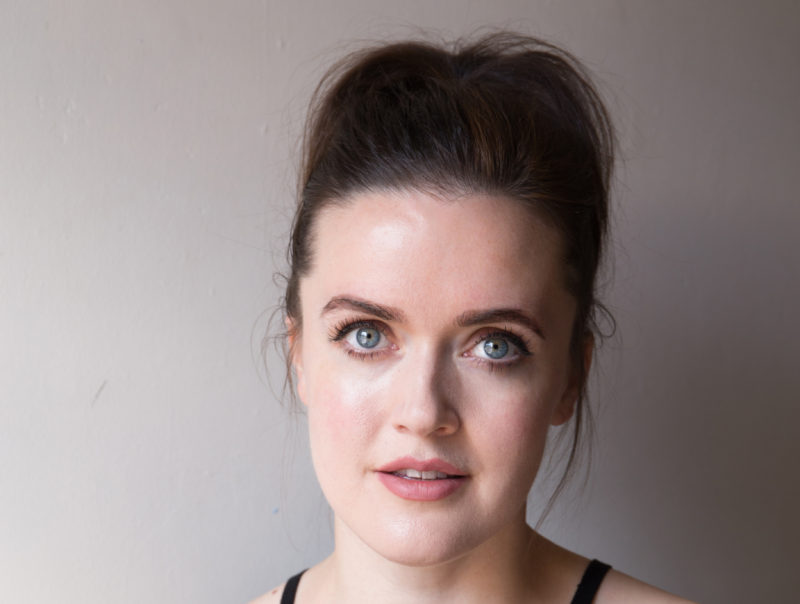As actress Aoibheann McCann breezes into a city-centre cafe between rehearsals, there’s no missing her. At 5ft 9in, sporting a patterned shirt, with striking features and an air of professionalism about her, she is just like her current onstage persona Widow Quin, and unobtrusively commands the space.
Amid her hectic run of John Millington’s Synge’s The Playboy of the Western World (Playboy) at the Gaiety Theatre, this outward-looking artist sits down with The University Times to put our ever-changing world to rights.
Starting with Playboy, McCann begins: “In the press beforehand, I noticed a huge emphasis on the fact that it was an all-female collaborating team. But I think the progress that each of those individual women has made as artists means that’s an old story.” She describes the gender imbalance as a happy accident rather than a conscious construction, adding that she finds this narrow media focus “tiresome as a feminist”. (Meanwhile, I’m sitting across from her thinking – if only Lady Gregory could see us now.)
Reflecting on the text and stage-world of Synge’s play, however, I find myself wondering how the Widow Quin fits into this atmosphere of neofeminism. “She’s a survivor”, McCann says, drawing on a textual reference to her having “buried her children and destroyed her man”. To embody the character, McCann rationalises this fact sympathetically. “She probably married a very violent man. They drank together, probably fought each other and I think she killed him in self-defence.”
She probably married a very violent man. They drank together, probably fought each other and I think she killed him in self-defence
McCann justifies her benevolent reinterpretation by highlighting Widow Quin’s good nature, as she alone stands by the controversial Christy until the final scene. Despite character Susan Brady’s quip that Widow Quin is looking for a second husband in Christy, for McCann this is “very much up for debate”. “In the middle of the show every night I go: ‘Maybe I do, maybe I don’t’”, she reveals playfully.
“In our version she isn’t identifying as gay or straight”, McCann says. “That was never even a conversation.” The physicality of the role does require McCann to centre her energy in the pelvis and sexual organs. But it’s not, she says, “in a sexy way”: “If Widow Quin becomes sexy, it’s not because she is trying to be sexy.” Far from the predatorial cougar of ages past, the Widow Quin of 2019 seeks to redefine her own boundaries.
As the conversation broadens, hints of environmental anxiety creep into the actress’s vocabulary. “Everyone on our creative team is particularly astute when it comes to environmental concerns”, she says. In particular, she credits designer Molly O’Catháin: “Every single thing I wear bar my jeans is second-hand. Everything that Pegeen wears is second hand.”
If you limit somebody’s materials, they tend to have to be creative. We need to re-adjust what we see as satisfying
As a part-time graphic designer and a vocal advocate for sustainable fashion, McCann admits to having been innately drawn to the aesthetics and texture of trend-dominated fashion in the past, but finds “that so incredibly ugly now”. When I ask why, she replies simply: “When you know something you can’t unknow [it].”
I then ask whether, as an artist, a commitment to sustainable fashion could pose creative limits. Lowering her voice, she leans forward as if disclosing a playground secret: “Don’t say this too loudly to the government or funding bodies, but if you limit somebody’s materials, they tend to have to be creative. We need to re-adjust what we see as satisfying.”
Her discontent at the lack of support for artists in the current climate is obvious. “If you applied the work ethic that artists are willing to have to tell a story to the mainstream, you would be laughing. But no-one has the same passion for anything else”, she says. “In the little time we may have left as humanity, I don’t want to live in a place where we don’t see that. At the end of the day what’s most important is your friends, your family and then art that you get to watch, feel and find yourself in.”
The Playboy of the Western World runs in the Lyric Theatre, Belfast until November 2nd.







